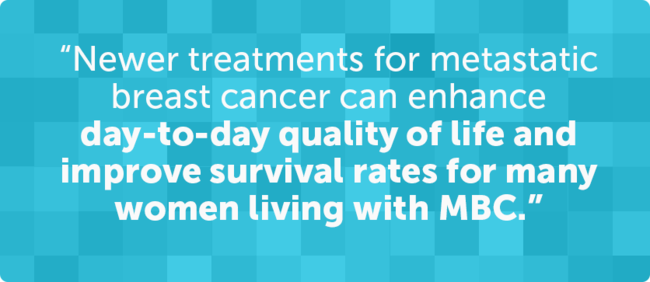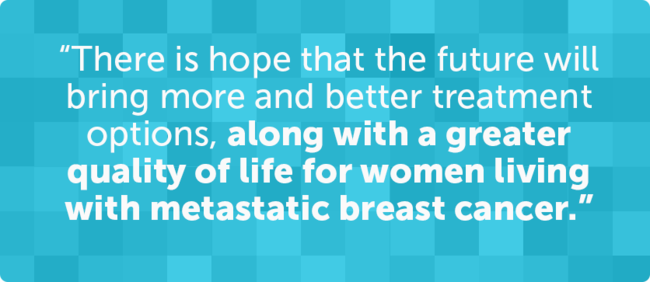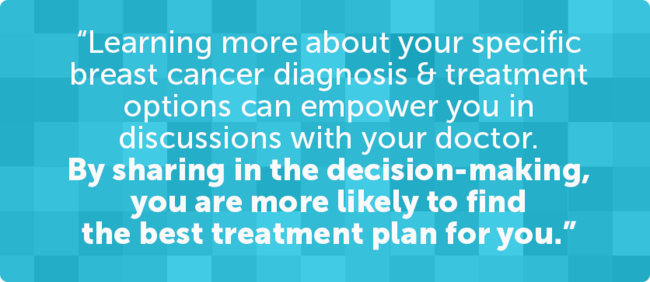
Powered By





 Continue with Facebook
Continue with your email
Continue with Facebook
Continue with your email
As breast cancer cells replicate and spread (metastasize), they are constantly changing and developing through genetic mutations. Metastatic breast cancer (MBC) is a moving target. Treating MBC, also known as stage IV breast cancer, requires science and medicine to move quickly to find solutions.
There are many drugs used to treat MBC, and new treatments are found every year. These breakthrough therapies are often safer, more effective, and have fewer side effects. Sometimes, new therapies can replace older treatments like chemotherapy and Tamoxifen.
New treatments can enhance day-to-day quality of life and improve survival rates for many women living with breast cancer. Today, 9 out of 10 women are alive five years after being diagnosed with breast cancer. MBC treatment options depend on the type of breast cancer. Some types of breast cancer are more aggressive and invasive than others. Some breast cancer treatments are effective for multiple types of cancer. Other classes of MBC treatment are highly specific and targeted.

Each case of breast cancer is diagnosed by type and by stage. Treatment plans for stage IV breast cancer are highly specific and unique to both the type of cancer and the person being treated. Identifying certain characteristics of cancer cells can help doctors know which treatments will be most effective.
Some types of breast cancer, called hormone receptor-positive (HR+) cancers, are fuelled by hormones such as estrogen and progesterone. These breast cancer cells are further labeled as estrogen receptor-positive (ER+) or progesterone receptor-positive (PR+) depending on which hormones they respond to. Knowing the hormone receptor type of your MBC helps doctors determine whether hormone therapy would be an effective treatment.
Human epidermal growth factor receptor 2 (HER2) is a protein involved in the cell growth process. HER2-positive breast cancer (HER2+) has higher-than-normal amounts of HER2 protein and is treated differently from HER2-negative breast cancer.
Triple-negative breast cancer cells do not have hormone receptors or HER2 receptors. Because of this, HER2-targeted and endocrine therapies aren't treatment options for people with stage IV triple-negative breast cancer. This can make triple-negative breast cancer challenging to treat.
Treating metastatic disease differs greatly from early-stage breast cancer treatment in that there is no finish line. Stage IV breast cancer does not yet have a cure. Essentially, women with MBC start a treatment and wait to see whether it controls the growth of the cancer. As long as the side effects are tolerable, the treatment will continue until it no longer works. In consultation with their breast cancer treatment team, they will then move on to the next best MBC treatment options. Because metastatic breast cancers often develop resistance to drugs, it’s common to change therapies multiple times.
Surgery, radiation, chemotherapy, hormonal therapy, and targeted therapies are all used to treat metastatic breast cancer in some situations. Each of these therapies work in different ways, and they can be even more effective in combination. Every person’s breast cancer treatment needs to be specific and tailored.
Targeted therapies are also called personalized or precision medicine. Targeted therapies respond to specific molecular, biological, and genetic traits of different types of MBC. They can stop or slow the growth or spread of breast cancer cells by disrupting their biology, functionality, or other traits.
There are several new targeted therapies approved for stage IV breast cancer. New targeted therapies also present many possibilities for combination treatments. Combination treatments offer more options, improve quality of life, and extend survival rates for people living with stage IV breast cancer.
There has been substantial investment and progress in breast cancer research over the last 40 years. Advances in screening and treatment have led to a promising era for people living with stage IV breast cancer. Genetically and molecularly profiling tumors has uncovered gene mutations that have led to new drugs and better, more personalized MBC treatment options.
Cyclin-dependent kinases are enzymes involved in cell division. Specific varieties of cyclin-dependent kinase — CDK4 and CDK6 — are involved in some cases of metastatic breast cancer. CDK inhibitors disrupt the role of CDK4 and CDK6 and stop MBC cells from replicating. The U.S. Food and Drug Administration (FDA) first approved CDK4 inhibitors to treat MBC in 2015. Verzenio (abemaciclib) was the first CDK4/6 inhibitor approved as a stand-alone therapy for MBC treatment in 2017. Other FDA-approved CDK4/6 inhibitors are Ibrance (palbociclib) and Kisqali (ribociclib). In 2018, the FDA approved Kisqali in combination with endocrine therapy, which proved successful in treating younger women whose MBC tends to be more aggressive than in postmenopausal women.
Immunotherapy is a field of cancer treatment that has shown great promise in a small number of people with stage IV triple-negative breast cancer. Immunotherapy bolsters the immune system’s ability to fight and eliminate cancer cells.
Checkpoint inhibitors are immunotherapy drugs that encourage the immune system’s ability to control tumor cells. Combined with chemotherapy, checkpoint inhibitors may slow MBC progression and extend survival. Keytruda (pembrolizumab) was approved in 2020 to treat triple-negative MBCs that have large amounts of programmed cell death protein 1 (PD-L1).
HER2-targeted antibody therapies are only used to treat people with HER2+ types of breast cancer. This class of drugs is designed to attack HER+ MBC in different ways. HER2-targeted therapies disrupt cell growth in HER2+ breast cancers, while slowing tumor growth and disease progression. Drugs in this class include Herceptin (trastuzumab) and Perjeta (pertuzumab).
Antibody-drug conjugates are a combination of an antibody therapy and a chemotherapy drug used to treat metastatic breast cancer. Antibodies are proteins produced by the immune system to attack specific targets. Some HER2 antibody-drug conjugates FDA-approved to treat HER2+ MBCs include Kadcyla (ado-trastuzumab emtansine or T-DM1) and Enhertu (fam-trastuzumab deruxtecan-nxki).
Trop-2 is a protein involved in cell signaling. Some breast cancers, including triple-negative MBCs, have cells with abnormally high levels of Trop-2. Trop-2 antibody-drug conjugates combine antibody therapy and chemotherapy to deliver chemo directly to the breast cancer cells. The Trop-2 antibody-drug conjugate Trodelvy (sacituzumab govitecan) was expeditiously approved by the FDA in April 2020. It is used to treat metastatic triple-negative breast cancers that have already been treated with at least two drug therapies.
Poly (ADP-ribose) polymerases (PARPs) are enzymes critical to DNA repair. PARP inhibitors work by disrupting breast cancer cells’ ability to repair their DNA. This makes MBC cells less likely to survive treatments such as chemotherapy.
In 2018, the FDA approved PARP inhibitors as the first-line treatment for MBC with a BRCA1 or BRCA2 gene mutation. Some PARP inhibitors approved for MBC treatment include Lynparza (Olaparib) and Talzenna (Talazoparib), which was approved in October 2018. PARP inhibitors usually have more tolerable side effects than chemotherapy drugs.
Phosphoinositide 3-kinases (PI3Ks) are enzymes important in cell growth. The PIK3CA gene helps control PI3K enzyme activity. Some breast cancers have a PIK3CA gene mutation. This mutation can affect PI3Ks and cause tumors to grow. PI3-kinase inhibitors are a class of drugs designed to halt breast cancer cell growth. In May 2019, the FDA approved Piqray (Alpelisib) to treat metastatic breast cancer with the PIK3CA gene mutation. It is a PI3K inhibitor approved to treat some hormone receptor-positive HER2-negative metastatic breast cancers.
Tyrosine kinase inhibitors (TKIs) target enzymes critical to various cell functions. TKIs work by disrupting the processes and functions of the cancer cell. Tukysa (Tucatinib), Nerlynx (Neratinib), and Tykerb (Lapatinib) are TKIs approved to treat some HER2+ metastatic breast cancers. Tukysa was FDA approved in April 2020 to treat HER2+ breast cancer that has metastasized or cannot be removed with surgery, after trying one or more other treatments.
Many more treatments for metastatic breast cancer are currently being studied or are already in development. There is hope that the future will bring more and better treatment options, along with a greater quality of life for women living with MBC.

According to the National Cancer Policy Forum, “a hallmark of high-quality cancer care is the delivery of the right treatment to the right patient at the right time.” The right MBC treatment is defined by your needs and the specifics of your cancer. Just as each person’s biology, medical history, and personal journey are unique, so is every case of breast cancer. No two treatment plans are the same. Your MBC treatment regimen may include many different classes of treatment at different times.
The right treatment for you may depend on many factors, including:
A personalized MBC treatment plan also depends heavily on the previous therapies that have been tried. You can also speak with your oncologist about clinical trials and whether they might be appropriate for your MBC treatment plan.
Learning more about your specific breast cancer diagnosis and treatment options can help you become your best advocate when you talk with your doctor. Be clear with your medical team about your priorities and what you want out of cancer treatment. By sharing in the decision-making, you are more likely to find the best plan for you.

Shared decision-making empowers people living with breast cancer to make informed decisions about their care in partnership with their doctors. In shared decision-making, health care providers make treatment recommendations based not only on the clinical data, but also on the personal preferences and values of the person being treated.
When you join MyBCTeam, you gain a support network of nearly 52,000 women living with metastatic breast cancer. You can share experiences with people who are undergoing the same therapies as you and get tips for living your best life with MBC. Are you exploring new treatments for breast cancer? Comment below or start a conversation on MyBCTeam.
Get updates directly to your inbox.



Recently Dx. With Stage 4. After Finding Cancer Cells In Ascitic Fluild.
 Continue with Facebook
Continue with your email
Continue with Facebook
Continue with your email
Become a member to get even more




A MyBCTeam Member
My battle with Breast cancer started 4 years ago, after so many Chemo, Radiation and other natural therapy treatments that I took just to cure my Breast cancer, it all did not work for my condition. I… read more
We'd love to hear from you! Please share your name and email to post and read comments.
You'll also get the latest articles directly to your inbox.